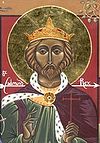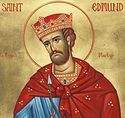

| Previous day | Next day |
| Old Style
November 20
|
Tuesday |
New Style
December 3
|
|
24th Week after Pentecost.
Tone 6.
Nativity Fast. |
Wine and oil allowed.
|
![]() Forefeast of the Entry of the Most Holy Theotokos into the Temple.
Forefeast of the Entry of the Most Holy Theotokos into the Temple. ![]() St. Gregory of Decapolis (816).
St. Gregory of Decapolis (816). ![]() St. Proclus, archbishop of Constantinople (446-447).
St. Proclus, archbishop of Constantinople (446-447).
Martyr Dasius of Dorostolum in Moesia (284-305). Martyrs Eustace, Thespesius, and Anatolius, of Nicaea (312). Hieromartyr Nerses, bishop of Shahrqart (Kirkuk), and his disciple Martyr Joseph, and those martyred with them in Persia: Hieromartyrs John, Shapur, and Isaac, bishops of Seit Selok; Martyrs Guhshtazad, eunuch, Mari, Sasan, Tima, Noah, and Zaun, of Lashom; and Bautha, Denachis, Thecla, Dinaq, Tatun, Mama, Mazakya, Ana, Abyat, and Hatay (343). St. Diodorus, founder of Yuriegorsk Monastery (Solovki) (1633). St. Parasceva (Rodimtseva), abbess of Toplovsky Convent (Simferopol) (1928).
New Hieromartyrs Macarius (Karmazin), bishop of Dnepropetrovsk, Arsenius (Dmitriev), abbot, of the Tikhvin Monastery, Eutychius (Kachur), abbot, of the St. Marcian Skete (Ukraine), Hilarion (Pisarets), hieromonk of Glinsk Hermitage, Alexis Amanov, archpriest, of Zaraisk (Moscow), Vladimir Medvediuk, archpriest, of Yazvishche (Moscow), Alexis Nikatov, archpriest, of Ignatovo (Moscow), John Savr, archpriest, of Tikhvin, and Alexander Sakharov, archpriest, of Petrovskoye (Ryazan) (1937). Nun Martyr Tatiana (Fomicheva) (after 1937). New Nun-martyr Ioannikia (Kozhevnikova), abbess of the Convent of the Entry of the Theotokos (Tikhvin) (1937).
St. Isaac, catholicos of Armenia (440). St. Theoctistus the Confessor, of Constantinople (855). Martyr Edmund, king of East Anglia (869). St. Sozomen of Cyprus (12th c.).
Thoughts for Each Day of the Year
According to the Daily Church Readings from the Word of God
By St. Theophan the Recluse

Tuesday. [I Tim. 5:11-21; Luke 17:26-37]
Whosoever shall seek to save his life shall lose it; and whosoever shall lose his life shall preserve it. One must understand it this way: to save your life means to pity yourself, while to lose your life means not pitying yourself—that is, on the path of the Lord’s commandments, or in working for the Lord. So, it is like this: he who works for the Lord, fulfilling His commandments without pitying himself, is saved; but he who pities himself, perishes. If you pity yourself you will unfailingly be found as a transgressor of the commandments and, consequently, an unprofitable servant; and what is the sentence for an unprofitable servant? Cast ye the unprofitable servant into outer darkness: there shall be weeping and gnashing of teeth (Matt. 25:30). Make an effort to watch yourself if only for a single day, and you will see that self-pity distorts all of our [good] deeds and kills the desire to do them. Without labour and effort, you will not be able to do anything; but if you regret forcing yourself—it all stops there. There are things which you must do, whether you want to or not. Such things are done without fail, difficult as they may be. But here self-pity is overcome by self-pity. If you don’t do them, there will be nothing to eat. But since what is required by the commandments are not of such nature, they are always omitted out of s elf-pity. You make condescensions to yourself when it comes to bad deeds, also out of self-pity. You hate to refuse yourself what you want and so the desire is fulfilled, even though it is either outright sinful, or will lead to sin. Thus it always goes with one who pities himself—what he should do, he does not, and what he should not do, he indulges himself in doing; and he ends up good for nothing. What salvation can there be here?
Wednesday. [I Tim. 5:22-6:11; Luke 18:15-17, 26-30]
Whosoever shall not receive the Kingdom of God as a little child shall in no wise enter therein. How is one to receive it as a little child? Here is how: in simplicity, with full heart, without a moment’s thought. A rational analysis is not applicable in the realm of faith. It can have place only on its threshold. An anatomist divides the whole body into its details, but does not see life. So also reason, no matter how much it reasons, does not comprehend the power of faith. Faith itself provides the contemplations which taken together show that faith completely satisfies all the needs of our nature, and obliges our consciousness, conscience, and heart to receive the faith. They receive it, and having received it, do not want to fall behind. Then, it is like tasting pleasant and healthy food. Having tasted once, we know that it is suitable, and we rank it amongst the nourishing substances. Chemistry does nothing to force this conviction, neither before nor after the tasting. Our conviction is founded upon direct, personal experience. Thus, the believer knows the truth of the faith directly. Faith itself instils in him the unshakeable conviction that it is faith. How, then, could faith be a faith of reason? In this lies the reasonableness of faith, to directly know that it is faith. Reason only ruins things, cooling faith and weakening life according to faith; but the main thing is that it is arrogant, and chases away God’s grace—an evil in Christianity of the first degree.
Articles
 St. Proclus the Archbishop of ConstantinopleSaint Proclus, Archbishop of Constantinople, from his early years devoted all his time to prayer and the study of Holy Scripture. |
 Martyrs Eustace, Thespesius, and Anatolius of NiceaThe Holy Martyrs Eustathius, Thespesius and Anatolius, natives of the city of Gangra, were the children of a rich merchant. |









